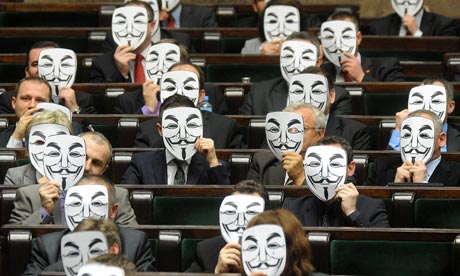
Approval of the controversial international anti-counterfeiting treaty Acta has been stalled by the European commission, which is to ask Europe's highest court whether implementing it would violate any fundamental EU rights.
The decision comes as the treaty faces growing opposition in parliaments, city streets and the internet, with some countries including Germany, the Netherlands and Poland declaring they would not approve the agreement in its current form – a stance that would make it impossible to ratify, because it requires every European country to sign up and approve it.
EU trade commissioner Karel De Gucht said on Wednesday that an opinion from the European court of justice would clear what he called the "fog of misinformation" surrounding the Anti-Counterfeiting Trade Agreement.
"This debate must be based upon facts and not upon the misinformation or rumour that has dominated social media sites and blogs in recent weeks," De Gucht told reporters in Brussels. "Acta will not censor websites or shut them down; Acta will not hinder freedom of the internet or freedom of speech." The ECJ will assess Acta's compatibility with the EU's fundamental rights and freedoms, such as freedom of expression and information or that of protection, he said.
The decision to refer the treaty to the ECJ appears to reflect recognition by EU officials of the political obstacles Acta faces. Earlier this month protesters marched against the agreement in several European capitals including London, Berlin, Helsinki, Paris and Vienna. Internet lobbyists and health campaigners have rallied against it, saying that overly strict controls of copyright would exclude people from the internet and prevent developing countries from accessing generic medicines. The agreement asks internet providers to co-operate with national authorities to crack down on online piracy, for example by cutting off internet access to users who illegally download music or films if that is part of the legal framework in that country.
"Intellectual property is Europe's main raw material, but the problem is that we currently struggle to protect it outside the EU. This hurts our companies, destroys jobs and harms our economies," De Gucht said.
At the same time MPs in a number of countries have said they will not sign it. Although the EU and 22 EU member states signed the treaty on 26 January 2012 in Tokyo, and the European council unanimously approved Acta in December, all 27 member countries have to formally ratify it for the EU to be a party to the treaty.
The US has signed the agreement. Others include Australia, Canada, Japan, Morocco, New Zealand, Singapore, and South Korea. Mexico and Switzerland participated in the negotiations but have not yet signed.
However Germany, Poland, Bulgaria, Slovakia, Latvia, Estonia, Cyrus, the Czech Republic and the Netherlands have all refused to sign the agreement on the grounds that it endangered freedom of speech and privacy
The hacking group Anonymous claimed responsibility last week for a series of hacks against the US Federal Trade Commission and consumer rights websites, whose front pages were replaced with a violent German-language video satirising Acta.
Acta has been under negotiation – almost all in secret – since June 2008. Its drafters say it is needed to harmonise international standards to protect the rights of those who produce music, movies, pharmaceuticals, fashion goods, and a range of other products that often fall victim to piracy and intellectual property theft.
The treaty has been questioned by members of the European parliament. In a statement Wednesday, David Martin, a spokesman on the issue for the Socialists and Democrats, the second-largest bloc in the parliament, welcomed the decision to get the court's opinion.
"Trade commissioner Karel de Gucht today admitted that there are still many question marks about Acta and what the implementation of the agreement, as it stands, would mean for citizens and for the freedom of the internet," Martin said. "The parliament has been calling for more clarity for a long time, and we already requested legal opinions from several committees in the European parliament. Now this ruling will be a good guarantee for the impact on fundamental rights.
EU officials say the agreement will not change EU law. They insist what was legal pre-treaty would remain legal the day after, and what was illegal would remain illegal.
But they have said the EU must ratify it as an example to other countries where intellectual property rights are less well protected than they are in the EU, in order to protect European products and ideas from being stolen elsewhere.
Opponents fear Acta would lead to censorship and a loss of privacy on the internet. The plan to gain court approval of the agreement has left at least some of them unimpressed.
"No legal debate can fix Acta or give it a legitimacy that by design it cannot have," said Jérémie Zimmermann, co-founder of the internet advocacy group La Quadrature du Net.

